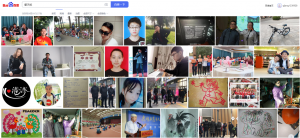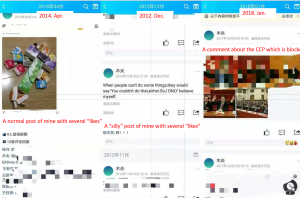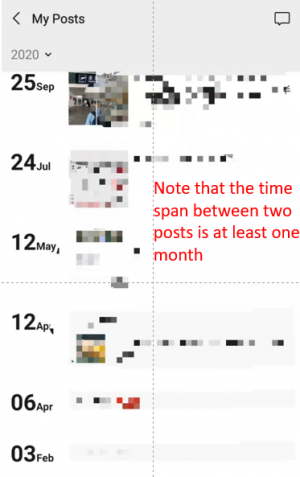Difference between revisions of "Tianshuo Yan"
| (6 intermediate revisions by the same user not shown) | |||
| Line 1: | Line 1: | ||
| − | + | [[File:tianshuo1.jpg|thumbnail|right|My selfie, help to compare with other Tianshuos' picture]] | |
| − | + | Information and Communication Technology (ICT) constructed a brand-new world for people, everyone could have his own data identity in the infosphere. Infosphere is nothing but another society. To illustrate, in the real world, we choose our clothes with painstaking attention to detail, select words to communicate, and are prohibited to do some behaviors by the laws. In the infosphere, people post their thought through pictures and text, whereas these posts are also regulated by some organizations. Thus, during the process of constructing digital identity, I have to balance the regulation of outside forces like tech companies and the will of our own, which is costly somehow. With limited energy, the more attention I pay to the digital world, the less I can do for their real-world identity, I need to do a multiple-choice problem. And in my opinion, I choose to run a better real-world life. | |
| − | == | + | ==Search Engines== |
| − | [[File: | + | ===Baidu=== |
| − | + | [[File:Other Tianshuos in Baidu search.png|thumbnail|right|Other Tianshuos' photos, not me]] | |
| + | Baidu is a search engine that is most frequently used by Chinese people. After searching my name in Chinese, "鄢天烁", several hits showed up, mainly about academic competitions. The main theme of my childhood life is study. I spent most of my time up until high school studying math, piano, Calligraphy and pretty much anything that my parents think could make me versatile. With plenty of skills, it is not strange that I have attended a lot competitions like Olympics’ Math Competition, Olympics’ Chemistry Competition and etc. If I do not want my online identity to be connected with my real-world identity, despite my willingness, the competition organizers will announce the results for fairness. This part of information is accurate, with which someone could tell a story about partly who I am in the reality with it. | ||
| + | Having a look at other information, I found it is mainly about the watch brand, Tissot. Considering my name pronunciation is similar to Tissot, Baidu's algorithm recommended this watch brand to me, as well as a lot links for me to purchase. Baidu has nothing to be blame. As a commercial and tech company, it benefits from the commercial advertisement and use its profits to make better products including search engines. This is a typical example of how tech company could control the information that flows to people. | ||
| + | Of course, I tried searching the image by key words "鄢天烁", it turns out to have other Tianshuos' photos rather than mine. | ||
| − | + | ===Google=== | |
| + | While I search for "Tianshuo Yan" in Google, the first term is the first blog I wrote at medium.com, which is the first assignment of SI410. Along with the second blog, they are the whole things about me available in google. What makes Google's results differ from those of Baidu's is some political news. One hit is about a journalist called Song Yan reporting Chinese government. I believe that it should have been available in Baidu is because it comes from a very famous Chinese news network called Chinadaily. | ||
| − | + | ===Some thoughts about the different presentation of two engines=== | |
| − | + | I failed to get much information about me in these search engines, whereas the information irrelated to me sparks my thoughts. Search engines like Google and Baidu will have their own algorithms to decide which piece of information in the data base is the first coming into the users’ view and which piece is the last. In my case, the information that is not directly related to me is ranked by these search engines, Nevertheless, there must be a lot people whose direct information is implicitly arranged by these tech companies. For example, a famous person could do both right things and wrong things, the search engine can decide which to show up at first. The celebrity’s digital identity will be largely influenced by the information order. At this time, the person’s identity is a result of interaction of both the person’s efforts and the search engines’ algorithm. | |
| − | + | ||
| − | + | ||
| − | + | ||
| − | + | ||
| − | + | ||
| − | + | ||
| − | + | ||
| − | + | ||
| − | + | ||
| − | + | ||
| − | + | ||
==Social Media Use== | ==Social Media Use== | ||
===Past Usage=== | ===Past Usage=== | ||
| − | [[File: | + | [[File:QQ posts.png|thumbnail|right|Three examples of my QQ posts (Red letters are brief translations)]] |
| − | The bulk of my social media journey started in my freshman year of | + | The bulk of my social media journey started in my freshman year of middle school, when I first created my QQ account way back in 2012. QQ is the Chinese version of What's Up app with some twitter functions like posting your life. Everyone would have those years, posting meaningless sentences, pretending to know the truth of the world, whereas these posts only make sense in their own mind. I was at this age when I started using QQ. I checked the posts history, and the first post was like "I am the selected one". The most interesting part is not the content itself, but what I have done to it after I "graduated" from that period. I set the post to be private so that others cannot see it. Like what I stated at the beginning, people in the infosphere have the right to set their own identity. My high school friends never know that I had such "silly" period and oddly aggressive declarations, hence this part of information about my real identity is lost. I certainly controlled my information and tried to make my online identity behave as I expected. |
| − | + | Graduated from that "silly" period did not mean that I became normal in the common sense. When I was in high school, the teachers asked us to read news. Sometimes I would have a chance to know about the drawbacks of the Chinese Communist Party (CCP), I had a sort of shameless confidence that I am the only person who knows these points. With the willingness of showing off, I post these points to QQ. These posts did not have comments from others usually. Even the meaningless sentences I posted before had someone click "likes" whereas this is abnormal to have no comments. The delivering of information meets hurdles this time. These hurdles were caused by the algorithm of tech companies like Tencent. QQ is a tech product of Tencent. Usually, a giant company like Tencent is regulated by the country. As the leading party of China, CCP ought to stop the unreliable comments including what I posted before from being delivered to keep the country together. This leads to the lack of anti-CCP part of my information in others’ cognition. Though I am glad my comments were not shown to others, this was not pleasant for 16-year-old Yan. Shortly speaking, some organizations set information barriers so that the information in the public infosphere is exhibited in the way they wanted. | |
| − | + | ||
===Present Usage=== | ===Present Usage=== | ||
| − | + | [[File:Wechat posts.png|thumbnail|right|Wechat posts example, note the time span]] | |
| − | + | I haven't used QQ anymore since I came to collage. Instead, I became a user of Wechat, which is another Tencent product. Wechat basically has the same functions with QQ with much cleaner interface and it is more concentrated on the online communication system. I merely post my idea to the moments, the frequency is decreased to about once a month, and I felt bored about the whole process. | |
| − | + | ||
| − | + | ||
| − | + | ||
| − | + | ||
| − | + | ||
| − | I | + | |
| − | + | ||
| − | + | ||
| − | + | ||
| − | + | ||
| − | + | ||
| − | The | + | ==Conclusion== |
| + | The more time I spend on social media, the more I feel that man's energy is limited. I need to consume most of time to keep my digital identity to act as I expected. I recalled two economic terminologies -- sunk cost and decreasing marginal utility theorem. Like I have stated, ICT have added another dimension to our world, making it possible to have another identity in a brand-new world. This is like an open-world game, it encourages you to explore and construct another self-identity in this world. At first, I was amazed by the digital world, reading others' posts and writing my own ones will give me plenty of happiness. As I read the posts day by day, even though they are different stories, the happiness I could gain from reading and writing is slowly but definitely decreasing, which is what strictly decreasing marginal utility theorem stated. When I could not attain utility from constructing my digital identity, posting became a burden to me. However, people will not close down their digital selves at this time because of sunk cost, like me at my freshman year in the collage. I found it was boring whereas I did not stop posting because I thought I have posted for years and there is no way for me to stop. The final straw was the economy class where I studied about the definition of "sunk cost". | ||
| + | Recalling that Luciano Floridi suggests, the current generation is possibly the last to experience a clear distinction between offline and online states (Floridi 99), I want to further add that, a man is not able to handle both world and it could be better if we make a choice. | ||
== References == | == References == | ||
“Self-Understanding.” ''The Fourth Revolution: How the Infosphere Is Reshaping Human Reality'', by Luciano Floridi, Oxford University Press, 2014. | “Self-Understanding.” ''The Fourth Revolution: How the Infosphere Is Reshaping Human Reality'', by Luciano Floridi, Oxford University Press, 2014. | ||
Latest revision as of 10:17, 5 March 2021
Information and Communication Technology (ICT) constructed a brand-new world for people, everyone could have his own data identity in the infosphere. Infosphere is nothing but another society. To illustrate, in the real world, we choose our clothes with painstaking attention to detail, select words to communicate, and are prohibited to do some behaviors by the laws. In the infosphere, people post their thought through pictures and text, whereas these posts are also regulated by some organizations. Thus, during the process of constructing digital identity, I have to balance the regulation of outside forces like tech companies and the will of our own, which is costly somehow. With limited energy, the more attention I pay to the digital world, the less I can do for their real-world identity, I need to do a multiple-choice problem. And in my opinion, I choose to run a better real-world life.
Contents
Search Engines
Baidu
Baidu is a search engine that is most frequently used by Chinese people. After searching my name in Chinese, "鄢天烁", several hits showed up, mainly about academic competitions. The main theme of my childhood life is study. I spent most of my time up until high school studying math, piano, Calligraphy and pretty much anything that my parents think could make me versatile. With plenty of skills, it is not strange that I have attended a lot competitions like Olympics’ Math Competition, Olympics’ Chemistry Competition and etc. If I do not want my online identity to be connected with my real-world identity, despite my willingness, the competition organizers will announce the results for fairness. This part of information is accurate, with which someone could tell a story about partly who I am in the reality with it. Having a look at other information, I found it is mainly about the watch brand, Tissot. Considering my name pronunciation is similar to Tissot, Baidu's algorithm recommended this watch brand to me, as well as a lot links for me to purchase. Baidu has nothing to be blame. As a commercial and tech company, it benefits from the commercial advertisement and use its profits to make better products including search engines. This is a typical example of how tech company could control the information that flows to people. Of course, I tried searching the image by key words "鄢天烁", it turns out to have other Tianshuos' photos rather than mine.
While I search for "Tianshuo Yan" in Google, the first term is the first blog I wrote at medium.com, which is the first assignment of SI410. Along with the second blog, they are the whole things about me available in google. What makes Google's results differ from those of Baidu's is some political news. One hit is about a journalist called Song Yan reporting Chinese government. I believe that it should have been available in Baidu is because it comes from a very famous Chinese news network called Chinadaily.
Some thoughts about the different presentation of two engines
I failed to get much information about me in these search engines, whereas the information irrelated to me sparks my thoughts. Search engines like Google and Baidu will have their own algorithms to decide which piece of information in the data base is the first coming into the users’ view and which piece is the last. In my case, the information that is not directly related to me is ranked by these search engines, Nevertheless, there must be a lot people whose direct information is implicitly arranged by these tech companies. For example, a famous person could do both right things and wrong things, the search engine can decide which to show up at first. The celebrity’s digital identity will be largely influenced by the information order. At this time, the person’s identity is a result of interaction of both the person’s efforts and the search engines’ algorithm.
Social Media Use
Past Usage
The bulk of my social media journey started in my freshman year of middle school, when I first created my QQ account way back in 2012. QQ is the Chinese version of What's Up app with some twitter functions like posting your life. Everyone would have those years, posting meaningless sentences, pretending to know the truth of the world, whereas these posts only make sense in their own mind. I was at this age when I started using QQ. I checked the posts history, and the first post was like "I am the selected one". The most interesting part is not the content itself, but what I have done to it after I "graduated" from that period. I set the post to be private so that others cannot see it. Like what I stated at the beginning, people in the infosphere have the right to set their own identity. My high school friends never know that I had such "silly" period and oddly aggressive declarations, hence this part of information about my real identity is lost. I certainly controlled my information and tried to make my online identity behave as I expected. Graduated from that "silly" period did not mean that I became normal in the common sense. When I was in high school, the teachers asked us to read news. Sometimes I would have a chance to know about the drawbacks of the Chinese Communist Party (CCP), I had a sort of shameless confidence that I am the only person who knows these points. With the willingness of showing off, I post these points to QQ. These posts did not have comments from others usually. Even the meaningless sentences I posted before had someone click "likes" whereas this is abnormal to have no comments. The delivering of information meets hurdles this time. These hurdles were caused by the algorithm of tech companies like Tencent. QQ is a tech product of Tencent. Usually, a giant company like Tencent is regulated by the country. As the leading party of China, CCP ought to stop the unreliable comments including what I posted before from being delivered to keep the country together. This leads to the lack of anti-CCP part of my information in others’ cognition. Though I am glad my comments were not shown to others, this was not pleasant for 16-year-old Yan. Shortly speaking, some organizations set information barriers so that the information in the public infosphere is exhibited in the way they wanted.
Present Usage
I haven't used QQ anymore since I came to collage. Instead, I became a user of Wechat, which is another Tencent product. Wechat basically has the same functions with QQ with much cleaner interface and it is more concentrated on the online communication system. I merely post my idea to the moments, the frequency is decreased to about once a month, and I felt bored about the whole process.
Conclusion
The more time I spend on social media, the more I feel that man's energy is limited. I need to consume most of time to keep my digital identity to act as I expected. I recalled two economic terminologies -- sunk cost and decreasing marginal utility theorem. Like I have stated, ICT have added another dimension to our world, making it possible to have another identity in a brand-new world. This is like an open-world game, it encourages you to explore and construct another self-identity in this world. At first, I was amazed by the digital world, reading others' posts and writing my own ones will give me plenty of happiness. As I read the posts day by day, even though they are different stories, the happiness I could gain from reading and writing is slowly but definitely decreasing, which is what strictly decreasing marginal utility theorem stated. When I could not attain utility from constructing my digital identity, posting became a burden to me. However, people will not close down their digital selves at this time because of sunk cost, like me at my freshman year in the collage. I found it was boring whereas I did not stop posting because I thought I have posted for years and there is no way for me to stop. The final straw was the economy class where I studied about the definition of "sunk cost". Recalling that Luciano Floridi suggests, the current generation is possibly the last to experience a clear distinction between offline and online states (Floridi 99), I want to further add that, a man is not able to handle both world and it could be better if we make a choice.
References
“Self-Understanding.” The Fourth Revolution: How the Infosphere Is Reshaping Human Reality, by Luciano Floridi, Oxford University Press, 2014.



